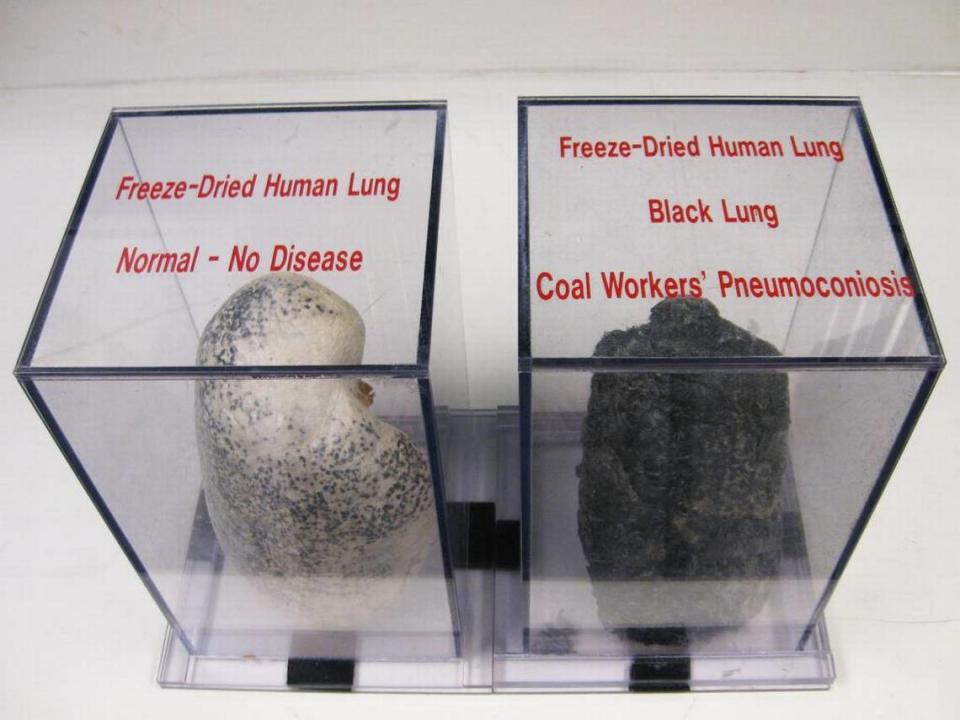Kentucky coal company fined $200,000 in case of cheating on tests to protect miners
An Eastern Kentucky coal company that pleaded guilty in connection with cheating on tests designed to protect miners from deadly black lung disease was sentenced to pay a $200,000 fine.
U.S. District Judge Robert E. Wier sentenced Black Diamond Coal LLC in federal court in Pikeville Thursday.
The judge sentenced Walter Perkins, who was in charge of the testing at Black Diamond, to six months in jail and six months on home detention for his role in the cheating.
Black Diamond operated an underground mine in Floyd County from August 2018 to April 2021, according to a court document.
When employees of the Mine Safety and Health Administration arrived at the mine on Oct. 8, 2020, they found a dust monitor sitting on a table in the first-aid trailer, when a machine operator was supposed to be wearing it underground, according to the court record.
The monitors are used to measure the concentration of respirable dust in coal mines, meaning dust that can be inhaled into the lungs. Machines that dig coal churn out dust from coal and rocks.
Coal companies are required to use ventilation and other measures to hold down dust in mines, and can be fined over unsafe levels.
Leaving the dust monitor in an office meant it would record clean air, not the level of dust inside the mine.
Coal dust causes black lung, an incurable disease that slowly chokes off a miner’s lung function, often leading to premature death.
Perkins told inspectors he had given the monitor to the operator of a continuous mining machine to wear, but that the operator returned it because it hadn’t worked properly, according to Perkins’ plea agreement.
However, MSHA was able to determine the monitor had not malfunctioned and hadn’t been underground because sensors in it hadn’t recorded any movement and the temperatures the unit recorded were warmer than in the mine.
The continuous mining machine operator told authorities Perkins had not given him the dust monitor during the time he was supposed to wear it.
“The purpose of these safety regulations is to prevent a progressive and irreversible disease,” said U.S. Attorney Carlton S. Shier IV. Shier said that companies that falsify the dust sampling aren’t just violating the law, “they are dramatically reducing the safety of their employees. That is simply unacceptable, and compelled us to prosecute this case.”

Black Diamond pleaded guilty to a charge of willfully violating a mandatory health and safety standard and a charge of making false statements.
Perkins, 45, of Harlan County, pleaded guilty to a charge that he authorized, ordered or carried out a violation of a health and safety standard and to a charge of making false statements.
Prosecutors said his actions “cut out the heart of that system designed to protect his fellow coal miners.”
In addition to the fine, Black Diamond is to pay $400 to any miner who worked at the mine during the violation but isn’t employed in the industry anymore — meaning they don’t get free screening for black lung — so they can get screened.
That payment to former miners is the first of its kind, according to a news release from Shier.
Perkins’ attorney, Michael B. Fox, argued in memorandum that a sentence of probation would be appropriate for him.
A supervisor told Perkins to lie to MSHA about the dust data, and his need to keep his job was a significant factor in his crime, the memo said.
“Walter was dependent upon his employer to maintain his livelihood and believed refusing to follow his employer’s directive to provide false information would result in his dismissal as an employee,” Fox wrote.
The attorney for Black Diamond, Brandon W. Marshall, said in a memo that the company closed not long after the inspection that led to the criminal charges.
In a situation in which some mine operators might have raised insolvency as a shield against a significant fine, Black Diamond instead wanted to make amends and worked out a “cooperative, meaningful, punitive” deal with the government, Marshall wrote.
After dropping for decades, the prevalence of black lung rose beginning around 2000, particularly in Central Appalachia, which includes Eastern Kentucky.
One study published in 2018 said that 20.6% of miners in Eastern Kentucky, West Virginia and Virginia had black lung, four times the rate among miners elsewhere in the country.
Researchers have pointed to several possible reasons, including increased dust from mining in thinner coal seams, but cheating on dust sampling was also identified as a factor.
A 2020 paper quoted miners and others as saying “negligent dust practices and fraudulent dust sampling have become commonplace in many Appalachian mines.”
“The Mine Safety and Health Administration can only protect miners from the risk of developing black lung disease if it has accurate sampling results,” Chris Williamson, an official with the agency, said in a news release. “Given the troubling spike in black lung cases in Appalachia, we must hold accountable those who choose not to comply with the law and put miners’ health and lives at risk.”

